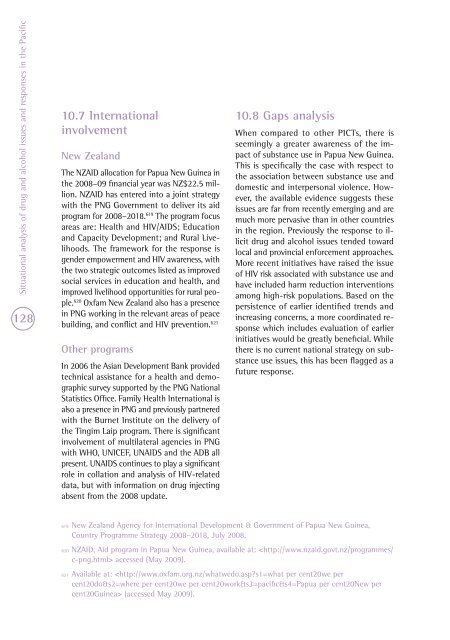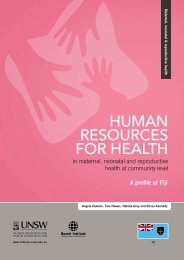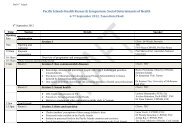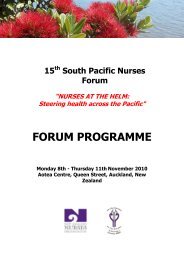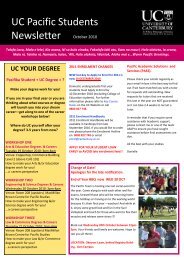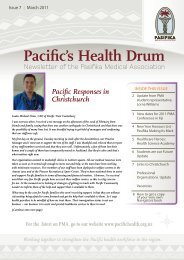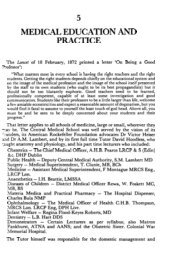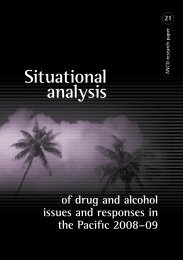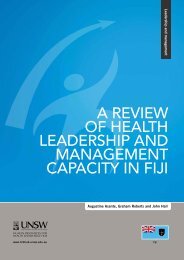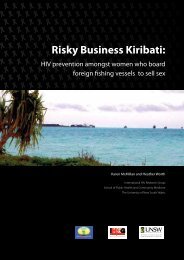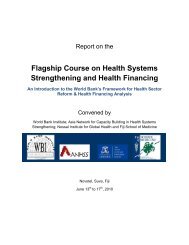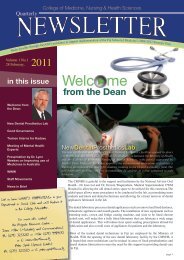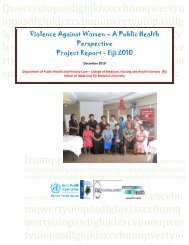rp21 situational analysis - Pacific Health Voices
rp21 situational analysis - Pacific Health Voices
rp21 situational analysis - Pacific Health Voices
You also want an ePaper? Increase the reach of your titles
YUMPU automatically turns print PDFs into web optimized ePapers that Google loves.
Situational <strong>analysis</strong> of drug and alcohol issues and responses in the <strong>Pacific</strong><br />
128<br />
10.7 International<br />
involvement<br />
New Zealand<br />
The NZAID allocation for Papua New Guinea in<br />
the 2008–09 financial year was NZ$22.5 million.<br />
NZAID has entered into a joint strategy<br />
with the PNG Government to deliver its aid<br />
program for 2008–2018. 619 The program focus<br />
areas are: <strong>Health</strong> and HIV/AIDS; Education<br />
and Capacity Development; and Rural Livelihoods.<br />
The framework for the response is<br />
gender empowerment and HIV awareness, with<br />
the two strategic outcomes listed as improved<br />
social services in education and health, and<br />
improved livelihood opportunities for rural people.<br />
620 Oxfam New Zealand also has a presence<br />
in PNG working in the relevant areas of peace<br />
building, and conflict and HIV prevention. 621<br />
Other programs<br />
In 2006 the Asian Development Bank provided<br />
technical assistance for a health and demographic<br />
survey supported by the PNG National<br />
Statistics Office. Family <strong>Health</strong> International is<br />
also a presence in PNG and previously partnered<br />
with the Burnet Institute on the delivery of<br />
the Tingim Laip program. There is significant<br />
involvement of multilateral agencies in PNG<br />
with WHO, UNICEF, UNAIDS and the ADB all<br />
present. UNAIDS continues to play a significant<br />
role in collation and <strong>analysis</strong> of HIV-related<br />
data, but with information on drug injecting<br />
absent from the 2008 update.<br />
10.8 Gaps <strong>analysis</strong><br />
When compared to other PICTs, there is<br />
seemingly a greater awareness of the impact<br />
of substance use in Papua New Guinea.<br />
This is specifically the case with respect to<br />
the association between substance use and<br />
domestic and interpersonal violence. However,<br />
the available evidence suggests these<br />
issues are far from recently emerging and are<br />
much more pervasive than in other countries<br />
in the region. Previously the response to illicit<br />
drug and alcohol issues tended toward<br />
local and provincial enforcement approaches.<br />
More recent initiatives have raised the issue<br />
of HIV risk associated with substance use and<br />
have included harm reduction interventions<br />
among high-risk populations. Based on the<br />
persistence of earlier identified trends and<br />
increasing concerns, a more coordinated response<br />
which includes evaluation of earlier<br />
initiatives would be greatly beneficial. While<br />
there is no current national strategy on substance<br />
use issues, this has been flagged as a<br />
future response.<br />
619 New Zealand Agency for International Development & Government of Papua New Guinea,<br />
Country Programme Strategy 2008–2018, July 2008.<br />
620 NZAID, Aid program in Papua New Guinea, available at: accessed (May 2009).<br />
621 Available at: (accessed May 2009).


